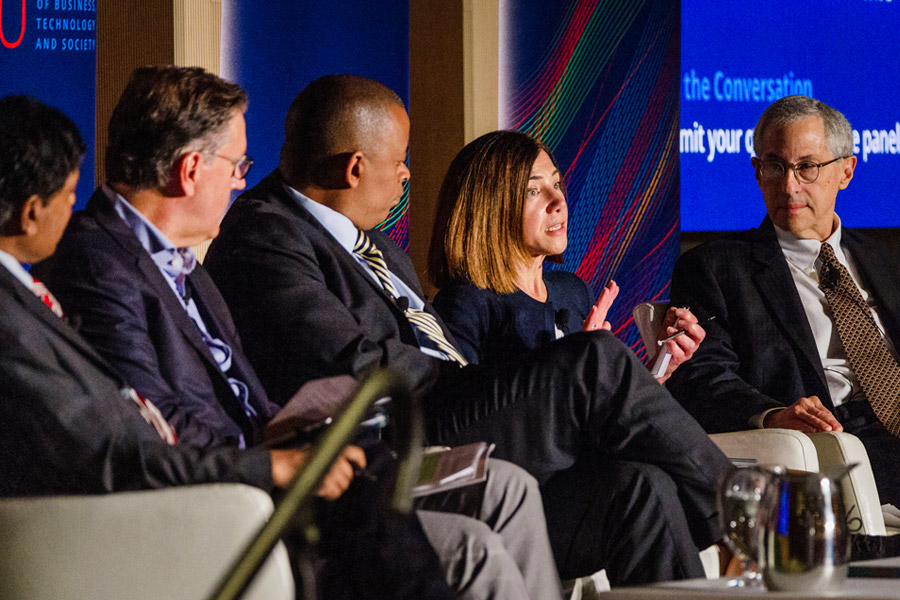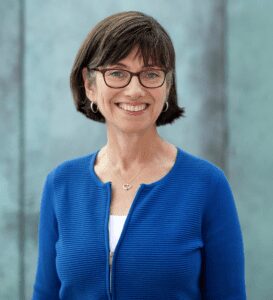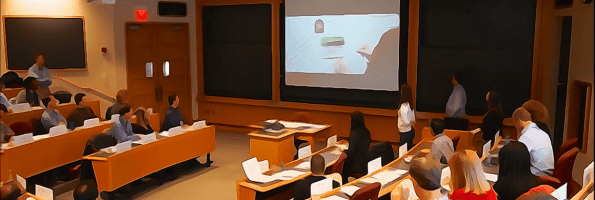Boston University’s Barbara Bickart Answers Our 5 Questions

In our latest installment of the MetroMBA “5 Questions” series, we speak with Barbara Bickart, Associate Professor of Marketing and Senior Associate Dean for MBA Programs at the Boston University Questrom School of Business. Bickart talks about the school’s new Online MBA, what’s next to come for the business school, and what type of student may be a perfect fit for the program.
1.) Why You Believe Now Was the Right Time for BU Questrom to Introduce an Online MBA Program?
“Significant advances in digital technology and education delivery platforms makes it possible to now offer high-quality and rigorous degree programs in an online setting. Because of these changes, at both the university and the school level, we felt it was imperative to develop the capability to offer online degree programs at scale. Further, the global market appears strong, particularly at the lower price point. edX has received over 10,000 inquiries for an online MBA program, making it their most requested Master’s degree. The edX technology platform is scalable and has a global reach of over 20 million learners, which will help us to expand our portfolio to reach a unique segment of business learners.
In addition, the global market for online professional education is sizable and there remains value in the MBA degree credential overall. According to a 2018 survey by the Financial Times, MBA grads nearly double their pre-MBA salary within three years of completing the degree.
Finally, the invitation to partner with edX provides an opportunity that aligns with our social mission to expand access to a top-tier business education throughout the world.”
2.) How Will the Questrom Online MBA be Different from Other School’s Online Programs?
“Unlike other online MBA programs, our program was designed from the ground up with the global online learner in mind. In the design process we leveraged knowledge gained from the BU Global Business Education Jams to create an updated and relevant MBA for the 21st century. Key themes include creating a socially responsible business, decision-making in a data-driven environment, managing with integrity, global business strategy, and developing an innovative mindset.
In addition, most other online programs offer traditional disciplinary-based courses. In contrast, our program focuses on developing the capabilities that lead to managerial and business success. By focusing on delivering capabilities versus disciplinary based courses we can leverage more fully the expertise of our alumni and other business leaders in developing exercises and cases that can better support a problem-solving approach to learning in a scaled environment.”

Barbara Bickart, Associate Professor of Marketing and Senior Associate Dean for MBA Programs at the Boston University Questrom School of Business.
3.) How Important is Being One of the First Major Business Schools in Boston to introduce an Online MBA?
“We are not the first online MBA in Boston. Babson, Simmons, and Northeastern offer traditional online MBA programs. We are, however, the first scaled MBA in Boston and only the second in the world.
Traditional online MBA programs are offered by about twenty of the top fifty MBA programs in the United States, and charge the same tuition as their residential program. Our scaled online MBA through edX is a new MBA category; and lies outside of the traditional and increasingly crowded online market. Our program will increase the accessibility of an online MBA both in the Boston region and globally.”
4.) Is This a Sign of More Programs to Come?
“Definitely! Entering the online MBA market at this time allows us to generate new capabilities, content, and infrastructure that will create hybrid flexibility in our current program portfolio and introduce new credit-bearing and noncredit-bearing programs in the future. We see also this initiative as creating the technology platform to develop forms of digital engagement to drive lifelong learning for our alums.”
5.) What Do You Believe Will be the Ideal Questrom Online MBA Candidate?
“The ideal BU Questrom Online MBA candidate is someone who has been working for about five to seven years, does not want to leave their job, and is seeking to advance their career. These individuals work in a variety of organizations, including the business, not-for-profits, education, and government sectors. They are busy people with complicated schedules and therefore seek the convenience of an online program. In addition, they may live in a location (either in the United States or abroad) where access to a high-quality MBA program is limited. They are curious and are motivated to complete a degree in an online setting.”
News Roundup: New Boston University Online MBA, and More

Let’s take a look at some of the biggest stories from this week, including the new Boston University Online MBA at the Questrom School of Business.
Questrom to Offer Online MBA With edX in 2020 – BU Today
Boston University’s Questrom School of Business will partner with online education platform edX to establish an Online MBA, set to begin in 2020.
On news of the announcement, Boston University President Robert A. Brown says, “With the online MBA, we’re seizing the initiative to offer a major degree for which we believe there is global demand. Higher education must evolve in a fast-changing world. We aim to lead in this evolution.”
Applications officially open on August 16, 2019 and tuition will be $24,000 per year. edX was designed from researchers at Harvard University and MIT in 2012. Since its launch, it has gained more than 21 million users from every country across the world. Chrysanthos Dellarocas, Associate Provost for Digital Learning & Innovation, says, “Through this degree, BU opens itself to the world in a manner we haven’t done before.”
edX started offering Master’s programs last fall, including a master’s in analytics from the Georgia Institute of Technology and a master’s in computer science fro the University of Texas at Austin.
You can read here for more on the online MBA and on edX.
Should Investing be Left to Machines? – UC Davis Graduate School of Management News
Professor and economist Brad Barber of UC Davis Graduate School of Management recently weighed in on the question of the effect of human error in investments. Comprehending biases, he suggests, is the key to improving decisions.
Behavioral biases cost investors 4 percent per year, according to Barber. In a recent article in financial news publication Raconteur, Barber’s research was cited as was that of his colleagues. On the topic of bias and error in investing,
Barber’s colleague Craig Burgess says:
“We are pattern-seeking primates, which is useful for hunting prey, but terrible for complex tasks such as investing. So, we are now regularly prone to hundreds of biases, too deeply ingrained to overcome without removing the human from the process.”
‘Passive investments,’ or those completed via carefully designed software processes, are cheaper than investments performed by a fund manager, and absent of the inherent biases of humans. Many managers, however, argue that skilled ‘active investors’ can beat the effect of bias and error to greater effect than machine learning. For more on Barber’s research, read his profile. For the full Raconteur article, read here.
Save the Date for INTERSECT@CMU: Health Care Innovation – Tepper School of Business Events & Conferences
This year’s INTERSECT@CMU Health Care Innovation Conference will take place on September 13, 2019 at the Tepper School of Business. Registration opens in August.
Among the topics covered by this year’s speakers and panelists will be delivery methods, policy, and emerging technology. Last year’s INTERSECT conference was part of a two-day celebration to commemorate the opening of Tepper Quad. It was also the conference’s inaugural year.

From INTERSECT@CMU 2018 / Photo via cmu.edu/tepper
Opening remarks last year were offered by CMU President Farnam Jahanian and Tepper School Dean Bob Dammon. Jerome Presenti, VP of AI at Facebook, Inc. delivered a keynote speech. Panels covered the growth of smart machines in everyday life, along with the potential of blockchain to revolutionize economies.
To stay posted on this year’s speakers and panelists, visit the INTERSECT@CMU 2019 site.
Million-Dollar Gift for Veterans – USC Marshall News
The USC Marshall School of Business recently announced a $1 million gift from Andrew Tavakoli, MSBA ’86, which will lend support to the Master of Business for Veterans (MBV) program.
The gift will establish the Andrew Tavakoli Family Endowment for MBV Students, which will enable veterans who show exemplary leadership skills and academic performance to advance at USC Marshall. The MBV is a one year graduate program for veterans, active duty, and reserve personnel. It was created to allow vets and those currently serving to apply their military leadership and strategic skills in business settings.
“My hope is that no qualified veteran or active duty personnel would ever be prevented from joining the USC MBV program for lack of financial resources,” Tavakoli says of the gift. He is a member of Marshall’s Board of Leaders and the Los Angeles World Affairs Council. Along with a MSBA from Marshall, Tavakoli holds a BSEE degree in computer science from the University of Pittsburgh and an MBA from California State University Long Beach.
MBV Program Director James Bogle says:
“I truly appreciate Mr. Tavakoli’s support for our veteran students in the MBV program. In our conversations, it quickly became clear that Andrew recognizes the unique potential that former military leaders bring to the business community. “
Read here for more on the MBV and on Andrew Tavakoli.
5 Tips for Making a Meaningful Connection with Employers – Fox School of Business News
Janis Moore Campbell, Director of Graduate Professional Development for the Temple University Fox School of Business‘ Center for Student Professional Development (CSPD) recently offered some helpful hints on how to rise to the top of the applicant pool during your job search.
According to Campbell, the “experience of you that you promise” to an employer is just as vital as your GMAT scores or strong academic record when designing your resume. Most employers want to know what it’s like to work with you, just as much as how well you will perform on any given project.

Work compatability is an under-discussed but important factor when it comes to employment, according to Fox’s Janis Moore Campbell.
Campbell outlines the following guidelines in honing in on your brand.
- Take a realistic look at your presence on the Internet.
- What have others said or posted about you? How well do you come across in light of your future bosses?
- Use facts, not opinions.
- Recommend, as opposed to asking to be recommended – Strengthen your network by reminding others of your presence. One sure way to get others to remember you is by mentioning their accomplishments.
- Strategically volunteer in a capacity that is similar to your career goals.
- Participate in trade associations
- Attend events and publish articles in your areas of interest and expertise.
- Join a network through trade associations
For more on the CSPD and for links to their social media sites, click here.
5 Questions with the Senior Associate Dean of MBA Programs at BU Questrom

In our latest installment of the MetroMBA “5 Questions” series, we speak with Barbara Bickart, the Senior Associate Dean of MBA Programs at Boston University’s Questrom School of Business. Bickart talks about the qualities MBA candidates possess, unique opportunities for MBA students, and things to do in Boston.
1. Why should an MBA candidate be excited to apply to Questrom?
“I believe three main factors make our program unique.
First, Questrom has a strategic focus on three sectors that we have identified as drivers of growth in our economy—digital technology, health, and social impact. We have developed unique program offerings as well as vibrant communities around these three sectors, and many of our students participate in one of these programs.
Second, our program is designed so that students can obtain a deep base of functional knowledge and key skills, and start their elective courses in the first year. Our first year is divided into four, seven-week modules. In the first three modules, students take three classes and complete an integrated experiential project. For example, in Mod 3, students take Strategy, Information Systems, and Organizational Behavior while working on a client-based project that addresses strategic issues in one of our three sectors. Through this process, students learn to view and solve problems from a multi-disciplinary perspective. Students can start taking elective courses during Mod 4.

Barbara Bickart is an Associate Professor of Marketing and Senior Associate Dean for MBA Programs.
Finally, Boston is a great place for students studying business, with a vibrant culture around innovation and technology. Our project-based learning draws on the Boston eco-system, and many of our students end up working in Boston or the immediate area.”
2. What type of MBA candidate is the best fit for Questrom?
“Our students come from a variety of backgrounds and experiences. In addition to being smart, intellectually curious, and engaged, the two traits that I would say best characterize our students are that (a) they care about community and the impact of their work on society and (b) they are agile and creative—they are flexible in how they think about and solve problems and look outside the box for solutions.”
3. How does Questrom stay on the cutting edge of MBA education? Is there a unique feature you can highlight?
“We are constantly evaluating and updating our curriculum, with a particular focus on adding more experiential learning opportunities in our courses and co-curricular experiences. Our faculty’s research often drives our elective courses. For example, one of our most popular elective courses is Platform Strategy. This course was developed by Professor Marshall Van Alstyne and is based on his book Platform Revolution: How Networked Markets are Transforming the Economy and How to Make the Work for You (2016, W.W. Norton and Co). In this course, student teams work on consulting projects for major platform-based companies. Past projects have been sponsored by Airbnb, Allstate, Capgemini, eBay, edX, Jawbone, Haier, Huawei, Mahindra, Pearson, PGA, PTC, Siemens, SAP, startups, and many others.”
4. What unique opportunities outside of the MBA curriculum make Questrom stand out?
“Our student community is active and engaged—there is always something going on here at Questrom. Students take advantage of the Boston ecosystem—attending networking events and conferences, for example, in health and life sciences. Questrom students are also involved Innovate@BU, which is a BU-wide initiative supporting student-led innovation and entrepreneurial activities. Students take advantage of the Build Lab IDG Capital Student Innovation Center, which is an on-campus co-working space for collaboration and new ventures. The Questrom School of Business Internship Fund provides financial support our students interested in exploring internships at not-for-profits. Finally, we offer a number to global learning opportunities, both in our curriculum and via student-run trips. Groups travel to Paris to study luxury marketing, South Africa to study social impact, Israel to study entrepreneurship, Vietnam to study manufacturing, and Silicon Valley to learn more about digital technology.”

“The views of Cambridge and Boston are amazing. I particularly love walking along the Charles during the Head of the Charles rowing races in October,” Bickart says.
5. What’s your favorite activity in Boston? Why?
“My favorite activity in Boston is to walk along paths on the Charles River. From my office, it takes just a few minutes to get to this path. The views of Cambridge and Boston are amazing. I particularly love walking along the Charles during the Head of the Charles rowing races in October. The races are exciting and fun to watch, and there is a lot of energy in the crowd.”
Starting a Business Straight Out of School? How HBS Supports Student Entrepreneurship

This coming weekend, Harvard Business School (HBS) will host an annual Entrepreneurship Conference sponsored by its own homegrown Entrepreneurship Club. The conference brings together hundreds of participants including “founders, joiners, and venture capitalists,” all of whom hope to connect through a smorgasbord of lectures, panels, chats, and networking sessions.
This year’s conference, scheduled for Saturday, March 31, is expected to draw more than 500 participants, including many top professors and professionals holding court on a variety of topics. Three keynote lectures will be given by CEOs and founders from Catalant Technologies, Strava, and edX. Strava’s Michael Horvath, who is also a professor of entrepreneurship at Dartmouth’s Tuck School of Business, will share his experiences having held several high-level roles at multiple startups.

Tuck Professor and Strava Co-Founder Michael Horvath will give one of the Entrepreneurship Conference’s keynote addresses.
In addition to the keynote lectures, the conference is also stacked with nine different panels. Some will include general discussions on topics such as starting a business during your MBA program and financing your startup. Others are more specific, covering some of the hottest fields in entrepreneurship right now. Examples of these include “Blockchain: The Next Transformative Technology?” and “AI/ML: Artificial Intelligence in Diverse Contexts.” Finally, attendees will also get to take part in a venture capitalist meet-and-greet and a networking lunch and cocktail hour.
HBS is extremely supportive of entrepreneurship, according to Jim Aisner, the school’s director of media and public relations. He spoke at length about the myriad ways in which HBS is a fantastic place for both seasoned and budding entrepreneurs, underscoring the range of support Harvard’s large entrepreneurial community offers to those looking to start their own businesses.
“Entrepreneurship is a major component of life at HBS, with some 35 faculty members doing research, course development, mentoring/advising, and teaching in this area,” Aisner told Clear Admit.
Harvard’s program requires all first-year MBA students to take an entrepreneurship course, and there are also a large number of entrepreneurial-focused electives on offer in the second-year Elective Curriculum. In addition, the school boasts multiple conferences and events that reach programs outside the business school. “There is a whole ecosystem [at Harvard] promoting and nurturing entrepreneurship,” Aisner notes.
Significant Programming Supports HBS Student Entrepreneurs
HBS is also home to the Arthur Rock Center Accelerator, which helps selected teams develop their ventures over the course of the year. In addition, the Rock Accelerator offers summer fellowships to support students from the entire student body who seek to develop entrepreneurial ventures during the summer and hosts a semiannual conference that brings 100 alumni back to campus each year.
Rock Venture Partners is a program that lets small groups of students learn more about investing in startups by supporting Rock Accelerator teams as they go through pitching and starting their ventures. Then there is the Harvard Innovation Lab, or i-lab, a resource available to current students at any Harvard school interested in exploring innovation and entrepreneurship at any stage. “The Innovation Lab creates a hotbed of cross fertilization for teams from across the university,” says Aisner.
Given this supportive environment, it won’t come as a shock that many HBS students decide to start their own businesses rather than pursue a more traditional career path in their post-MBA life. Out of more than 900 students, eight percent of graduates from the Class of 2017 chose to start their own businesses upon graduation, up from six percent in the Class of 2016. Although this growth is indicative of a national trend toward more and more recent MBA grads founding startups, HBS outperforms many top schools in this regard. By comparison, at Chicago Booth just 3.2 percent of 2017 MBA grads went immediately into running their own startups. Meanwhile, at the University of Pennsylvania’s Wharton School, just 2.3 percent of the most recent graduating class founded businesses.
As another indicator of its commitment to fostering entrepreneurship, HBS will host its annual New Venture Competition on April 18th, which bestows more than $300,000 in prize money to outstanding new ventures. Contestants may apply in either the business track, with ventures that drive substantial market value, or the social enterprise track, with ventures that drive social change. This recent Clear Admit article noted that the social enterprise track received 69 entries this year, more than ever before.
Nationwide, more and more students have begun to pursue startups at all stages of their MBA careers. From this weekend’s student-led Entrepreneurship Conference to the wide range of related centers, faculty, and other support, HBS’s investment in nurturing its entrepreneurial students is clear.
This article has been edited and republished with permissions from our sister site, Clear Admit.
MIT U LAB Returns for MOOC

MIT Sloan School of Management course, Transforming Business, Society, and Self with U.Lab, has returned to Mooc.org, part of the not-for-profit enterprise composed of 30 leading global institutions that aims to transform online and on-campus learning on an open source platform, for another session. The course, taught by MIT’s Otto Scharmer, was reviewed as “eye-opening” or “life-changing” by 88 percent of the students who had previously completed it.
According to edX, ” U.Lab has inspired the first-known use of a MOOC by a government as a platform for citizens to shape the issues that matter to them, it has been used in management teams of the world’s leading NGOs, and it is now being used in 42 Impact Hubs worldwide – by locally-rooted, globally connected communities of change makers to catalyze systemic change.”
